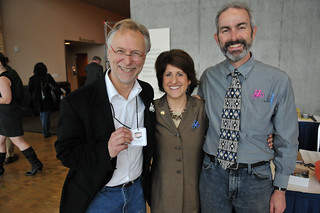
Senators Dingfelder and Prozanski at the Oregon
Active Transportation Summit in 2011.
(Photo © J. Maus/BikePortland)
State legislators in Salem have tried time and time again to “start a conversation” about making Oregonians who ride bicycles pay for the pleasure of doing so. In recent memory we’ve had a draconian and ill-advised mandatory registration bill and just last week Senator Larry George (R-Sherwood) introduced yet another “bike tax.” Unfortunately, those bills only made people angry, and rightfully so, since they were punitive, discriminatory and not well thought out.
If legislators really want to start a conversation about bike-specific transportation funding (instead of simply throwing red meat to anti-bike constituents or serving their personal feelings of bicycling disrespect), they’d be better off 1) thinking up a policy idea that would actually work and 2) working with bike advocates before introducing the bill.
Senate Bill 756, introduced late last month by Senators Floyd Prozanski (D-Eugene) and Jackie Dingfelder (D-Portland), is an example of that approach.
In a nutshell, the bill would allow a registered owner of a motor vehicle to make a voluntary donation to the state for the specific purpose of “improving bicycle and pedestrian facilities.” The donation would be made when the car owner renews their registration. So as not to incur new administrative costs, the donations would go to the State Parks and Recreation Department Fund, an existing pot of money already set up to accept donations. When someone receives their auto registration renewal they’d simply tick a new box and the donations would be pegged for the Oregon Scenic Bikeways program.
The idea for SB 756 came from veteran bike advocate Jerry Norquist, a central Oregon resident and former ride director for Cycle Oregon*. Norquist knows his way around the State Capitol. In 2007 he spearheaded the successful effort to create Oregon’s Share the Road license plate.
“Let’s show we’re willing to be part of conversation, but it’s a collaborative conversation.”
— Sen. Jackie Dingfelder
Sen. Dingfelder said work on the idea hastened in the past few months because she, along with her constituents and other legislators, were, “Getting tired of these punitive bike registration bills.” “Let’s show we’re willing to be part of conversation,” she said during a phone call last week, “but it’s a collaborative conversation.”
Dingfelder sees the bill as a way to score a win-win: It would raise money for the Scenic Bikeways program (which has been a big success since being established in 2008), and it would be a politically “symbolic” gesture to show people that ride bikes have some skin in the game. (Of course, the fact remains that people who bike already pay for the roads; but let’s accept the fact (for now at least) that most people in Capitol don’t think they do.)
Since the Scenic Bikeways programs is run out of the State Parks department, SB 756 would sidestep ODOT completely (something Dingfelder is likely keen to do given her courageous vote against ODOT’s top priority, the CRC project, last week) and by using the existing Parks’ fund, the bill has no fiscal impact attached to it.
Also, unlike Senator George’s bike tax bill — which predictably whipped up lots of attention from The Oregonian even though George has no intention of pushing it forward because he introduced only at the behest of a vocal constituent — SB 756 is actually moving. There’s a public hearing on the bill on March 25th and 3:00 pm in front of the Senate Committee on Business and Transportation.
Let the conversation begin.
(*Disclaimer: I was shown an early concept of this bill and offered my opinion and insights about it to Norquist.)


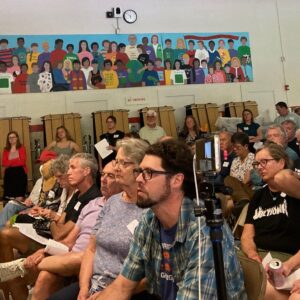
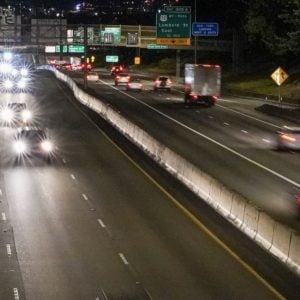
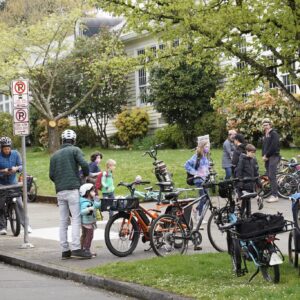
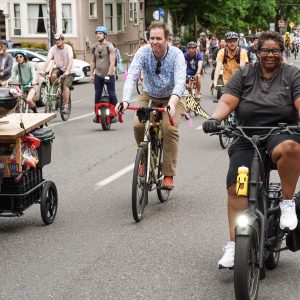
Thanks for reading.
BikePortland has served this community with independent community journalism since 2005. We rely on subscriptions from readers like you to survive. Your financial support is vital in keeping this valuable resource alive and well.
Please subscribe today to strengthen and expand our work.
this part I don’t understand:
“it would be a politically ‘symbolic’ gesture to show people that ride bikes have some skin in the game.”
Do you mean that people who bike on scenic roads have supporters among the car-driving public?
I suspect this is a phrase implying that there are a number of bicycle riders who choose to own and maintain a motor-vehicle while choosing to ride a bicycle (or transit) as their local transportation choice. OR There are drivers out there who are interested in bicycles being given safe routes and passageways because they realize there are a great number of drivers handling their vehicles as weapons of intimidation toward bicyclists …
I suppose. But as wsbob put it below–much more eloquently than I–this is an unusually indirect not to say obtuse bit of logic for someone who already has an opinion about this subject to follow (or more importantly to not misunderstand).
Now that I’ve learned a little bit more about the origin of that phrase, I like this logic even less.
“The term is used to ask or convey an owner(s) or principals undefined but significant equity stake in a investment vehicle where outside investors are solicited to invest. The ‘skin’ refers to equity and the ‘game’, the investment vehicle.”
http://en.wikipedia.org/wiki/Skin_in_the_game_%28phrase%29
Voluntary token payments by license plate purchasers does not register in my view as “undefined but significant equity stake,” whereas bicycling among the things the license plates are attached to does, though equity would have to be understood very broadly.
bicycling among the things the license plates are attached to
That’s a literal definition of “skin in the game,” and flesh and bones.
I like this idea. It would also be nice if there were a way for people that don’t own cars to be able to contribute to the same fund.
However, we will probably need to find a more robust long-term solution to funding bicycle and pedesrian infrastructure than relying on voluntary donations. If we are going to build out the Portland Bicycle Plan for 2030, we need to be serious about funding it. Imagine if the CRC were funded with voluntary donations via vehicle registration? The difference in funding approaches to these shows where our priorities lie.
“Imagine if the CRC were funded with voluntary donations via vehicle registration? The difference in funding approaches to these shows where our priorities lie.”
Nicely put.
“If we are going to build out the Portland Bicycle Plan for 2030, we need to be serious about funding it.”
A silver lining is that well before 2030 we’ll discover the depth of our regrets at having dilly-dallied shifting all funds away from cars and toward modes that can work in a post-carbon world. This bill, also, directs money toward leisure biking rather than the kind of biking that the Portland Bike Master Plan envisions.
Good point. I now live in the car-centric Santa Clara (aka Silicon) Valley and when put to vote, citizens here repeatedly increase sales taxes in order to fund highway improvements (what they consider ‘bad’ roads here boggles my mind, having grown up in pothole-ridden Boston, but traffic congestion is definitely bad). I suspect if, as you propose, road improvements were paid for by grassroots-level funding efforts – which this approach seems similar to – the outcome would be substantially different.
Now there you go. This is at least a step forward and is workable. I myself would GLADLY pay a little extra when I register my car to give money for bicycle related projects across the state.
This afternoon I will be writing letters to both of these state representatives thanking them for putting forward this idea and letting them know I will support it.
I’m confused as to how this is that different than getting “vanity” cycling plates for your car? Sounds about the same on the surface.
This goes to the Scenic Bikeways fund. Bicycling plate funds go to BTA and Cycle Oregon. http://www.oregon.gov/ODOT/DMV/Pages/vehicle/platenonprof.aspx
That, then, gets into the whole Parks v. DOT funding stuff seen on other bike trails. I like riding bike trails, but without actual roads more welcoming to bikes to create complete safe biking networks, they still seem to me to be isolated recreation facilities (with exceptions, of course).
It seems BTA and Cycle Oregon got $10 one time only when I got my Share the Road plates. I wish my STR plates did cost an an extra $10-$20 to go to bike infrastructure each time I register my car.
and if you could donate your $50 oregon political tax credit each year to this cause, i would be simply delighted.
You would do better to actually make a $50 political contribution to someone who will advocate for your cause.
Another idea would be to put the donation area into the state tax return form, like what is done with federal taxes.
When I used to get larger tax returns (thanks to school deductions), I’d check all the donation boxes on my federal return and usually wound up giving back over $100 in total to many different charities.
My thinking is that people who are already getting hit up for $120 or whatever at the DEQ may not feel like paying more. Just using myself as an example, I didn’t upgrade to the “cycling” licence plate because it was going to be even more money on top of what I was already paying.
But if they are getting a tax refund, maybe they’ll feel like throwing $5 into the pot? Who knows.
I don’t know. A lot of these suggestions reinforce (to me at least) the idea that biking is this discretionary thing you hold a bake sale for, rather than real roads that are for cars and that are funded out of taxes.
Yeah, that’s how I feel as well, though I don’t understand city/county/state revenues and taxes enough to offer up any better alternative, other than sticking with the status quo.
Wish there was a way to raise money without it looking like an admission of “cyclists not paying their fair share whagarbl!”.
Remind Matt Garrett that he doesn’t like/thinks we’ve moved beyond discrete funds categories (silos)?
http://bikeportland.org/2012/05/15/an-interview-with-odot-director-matt-garrett-part-1-71580
Hypothetical premises can only produce hypothetical conclusions. That’s a nice rhetorical device for this discussion (really, it’s fine to do that!) but I honestly don’t think the overall transportation discussion can move along without some solidly grounded facts about how we, as a society, choose to spend our collective wealth. Everything I’ve read tends to support VTPI’s “Whose Roads?” conclusions, but those sorts of studies need to be done by many different DOTs (Portland and Oregon being two examples), and conducted by unbiased parties with rigorous accounting priciples applied, and built into a process which produces the sort of “which dollar pays for what goods & services” reports , every single year. It’s that process of seeing over and over, year after year, where their money is going, that wears down taxpayers to change their actions for something more effective. IMHO, of course.
If that type of budget oversight was actually performed, we may not have the government spending deficits we’ve now grown accustomed to.
With the basic funding mechanism of this bill…voluntary contribution by a registered motor vehicle owner…a clear indication that the money contributed is from people that ride bikes, is not made.
This approach to raising money for improvement to and maintenance of bike infrastructure won’t do a thing to further an understanding of the potential biking may have to help resolve multi-mode use of roads and congestion issues.
The donations would go to the Oregon Scenic Bikeways Program. Establishing and developing scenic bikeways throughout the state is important, but it would seem that improvement to, maintenance of and expansion of bike infrastructure within and between urban areas is a far more important designation for bike specific money.
I already contribute lots of money to the fund by registering my car and paying property taxes, and in return I do a fraction of the damage to the roads that cars do. Why would would I want to pay MORE? If anything I should be getting a tax break. Remember this article by Elly Blue?: http://grist.org/article/2010-09-27-why-an-additional-road-tax-for-bicyclists-would-be-unfair/
“The average driver travels 10,000 miles in town each year and contributes $324 in taxes and direct fees. The cost to the public, including direct costs and externalities, is a whopping $3,360.
On the opposite pole, someone who exclusively bikes may go 3,000 miles in a year, contribute $300 annually in taxes, and costs the public only $36, making for a profit of $264. To balance the road budget, we need 12 people commuting by bicycle for each person who commutes by car.”
1. mileage-based registration and road fees.
2. a minimum fee where any dollars not reflected in mileage go to alternative transport.
Your perspective is the most realistic stated on this page. I pay all of the associated fees and taxes of a home owner who owns 2 motor vehicles (car and motorcycle) and I have not driven even an entire gas-tank worth of miles on the roads in two years while supporting all of the fees and taxes associated. All of this while putting up with the risks associated to various types of drivers (phone using, radio tuning, non-signaling, aggressive, intimidating, abusive, un-tabbed, and so on) and their wear and tear on the road.
This is a good idea and can be combined with a voluntary bike license/registration fee of maybe $10. This would register your bike in a database (it could even go as far as having component information and pictures included as part of the ID number file). This would give extra protection against theft, make stolen bikes easier to recover and other tangible benefits to cyclists that pay the fee yet to be determined. This money can be targeted directly to city street bike friendly improvements like bike lanes and greenways.
As long as these programs are voluntary and are NOT used as an excuse to remove bike transportation funding from other more traditional sources these are good ideas. Just like a voluntary $1 charge to ride over the new monstrosity of the CRC if it gets built…or the Sellwood for non-Multnomah county residents since we re paying more than our fair share for it. Symbolic gestures like this not only could raise some money, but also give us more support among fiscally conservative moderates.
“Symbolic gestures like this not only could raise some money, but also give us more support among fiscally conservative moderates.”
Have you considered the possibility that symbolic gestures like you are proposing can also backfire, reinforce unhelpful misperceptions about how transport funding actually works, what shares are currently paid for by those traveling by various modes?
Do you have any examples where those sorts of voluntary fees have worked? How much money did it raise in those cases?
This would be great, if there was an additional box that read: Make my trail donation SINGLETRACK.
How about a tick-box on our property taxes for “don’t use any of my taxes for motor vehicle support?”
(just askin’)
I am constantly amazed that “we” are satisfied with the fact that our elected officials (whose JOB it is to understand the way funding works) can’t figure out that people who ride bikes pay for the roads. I can assure you if I showed up at my job and didn’t understand a pretty basic facet of how the company ran, I would be out looking for work pretty quickly. Instead, these yahoos are content to whip up an even less informed constituent base who all scream out that people like me don’t pay for the roads we ride on. What crap. One of the advantages of having a representative democracy is that the elected officials are SUPPOSED to learn more about the issues and then vote what makes sense for all of us–not only their loudest/least informed constituents. If we can’t rely on state level elected officials (who have staff to help them understand issues) to “get” how funding works, what is the value in giving a symbolic extra fee. I am sure I won’t be paying it, and then they will say, see only 3.5% of people support bike infrastructure. This seems like a bad idea.
Jeremy, I agree. These people have ONE job, and they can’t do it right. All they’d have to do it google “do bicyclist pay for the roads” and the 1st 300 hits would be YES. http://www.webikeeugene.org/2013/03/07/bicyclists-already-pay-their-fair-share-or-idiotic-oregon-senator-larry-george-fails-to-do-independent-research-proposes-yet-another-bike-tax/
parks & rec isn’t getting any of my money for bicycling until they start treating their trails like transportation venues…
I don’t like it. I don’t want to finance “scenic bikeways”, I want to finance safety improvements in the cities where they will benefit everyday cyclists, every day.
The scenic bikeways focus only serves to reinforce the stereotype of bicycles as toys or a sport, not serious transportation.
An important point, but I’ve found it a difficult one to make here. Folks find it hard to differentiate between asserting the importance of cycling for transport/as an alternative to what we typically think of cars as having been for, and criticizing cycling for fun and adventure. The latter is of course wonderful and important in its own right but, as you say, upholding it as the face of cycling (as this bill does) does a disservice to the battles that have yet to be won on urban cycling safety, feasibility, accommodation, funding, etc.
I should make the suggestion that there instead, be included a check-box that just states whether the person renewing their tabs or paying their state taxes owns or has used a bicycle on the public roads in the last year (or two years) as a form of transportation or recreation (possibly separate check-box for each) … I suspect there would develop a better idea of how many people should have some aspect of their tax money properly designated or at least accounted for, in the number of people paying taxes actually riding a bike corresponding with the possible benefit from this ‘PROPER USE OF PUBLIC FUNDS’, through the proper appropriation and recognition of funds from the pool which they are supposed to come.
Let’s say a bunch of folks want to hang out and drink some beer together, so they each chip in $5 to buy a keg. Now, a few of them are actually tea totallers and just drink water, but they’re OK with their $5 spent just for the social function. For a larger group, that $5 just about covers the beer they’re going to enjoy; their contribution is in parity with the cost of the beer they consume. And then there’s another big group where each person consumes considerably more, hanging out longer, doing guzzling games and generally consuming more beer. When the keg blows, they still want some more!
Which of the following do we do, and what are the resulting consequences to that nice social gathering?
(a) ask the tea totallers to voluntarily contribute more?
(a1) tell the tea totallers they must pay more?
(b) up the price for everyone to $8 or $10 or whatever it takes for the guzzlers to drink their fill?
(c) charge $3 for each beer beyond two?
(X) Or?
Glad to see this bill proposed. Many of the Scenic Bikeways are in very rural parts of Oregon and serve as an economic development tool for the small towns along the routes. They help bridge the urban/rural divide when it comes to bicycles. The more successful they are, the more likely the small communities will thrive, winning over more champions for bicycling in the unlikeliest of places. Having just come back from the National Bike Summit, one of my big takeways was you need success stories when talking to representatives. Often, there are too few in more rural regions. But the Scenic Bikeways may change that and will make cycling important and relevant to those rural communities and the politicians that represent them.